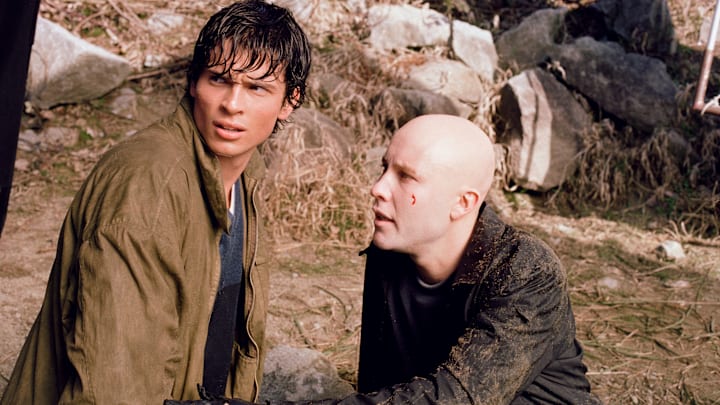Smallville gave us the Young Clark Kent storyline that we all needed. Tom Welling captured our hearts as we watched him step into the Superman that we would eventually know him as.
Over the years, we met many characters that we know from the comics. Lex Luthor continued to be the villain of the story, but we saw so many others step in, including some who looked like they could have been friends at first. Lois Lane, Oliver Queen, and more iconic characters came into the story, giving us more of the DC universe we loved on the small screen.
The series ended with its 10th season. At the time, it was the longest-running sci-fi series in the United States, but Supernatural took over that as it continued to gain the hearts of fans. That doesn’t take away from the feat that Smallville set as it still holds the record for being the longest-running live-action superhero series, and we would have loved to see more if The CW would have let us.
The cost of the series may have played a role in Smallville’s cancellation
The CW never officially stated Smallville the series was cancelled. However, there was some speculation at the time, and the decline in the linear ratings may have played a part.
Smallville was one of those shows that moved to The CW when The WB and UPN merged. It then continued to be a ratings driver for a long time, until eventually fans started to drift away. That is normal for all shows (especially ones that run for a lot of seasons!). People start drifting off as storylines continue, especially as some of their favorite characters leave. However, the ratings were still pretty strong for The CW at the time, so that likely wasn't the main factor in the decision to end the series.
There was another factor involved, however, and this is where the disappointing reason comes in. It all came down to the cost of creating the series.
Smallville was huge in the graphics. It took a lot in the CGI department to create a high-quality series. Even now, the cost of the graphics would lead to a cancellation if the linear ratings started to dwindle. We’ve seen that happen to a lot of shows in recent years, including Timeless and Quantum Leap on NBC.
The CW has never been a network operating in the black. It’s something new owners Nexstar are trying to change with its recent takeover, so it’s not that surprising that The CW would cancel some shows if they became too costly.
There was an end to Smallville’s original premise
There was also an understandable reason to end Smallville after 10 seasons. Just how long could the original premise go on? The whole point of the series was to give us a Young Superman. We wanted to see Clark Kent before he could fly and before he would routinely save the world as The Man of Steel, and we got it.
The series started in high school, but eventually, Clark had to grow up. We needed to see him get to the point in the movies where we know him as Superman and Clark Kent in one.

A show like Smallville needed to have a defined ending. Whether that was the case or not will now likely always be unknown. The simple fact is that a defined ending was necessary. Once we got the Young Clark Kent storyline, it was pretty much over and done. The rest of the series would step into the world of the Superman movies that we’d already come to know and love.
That is disappointing, but it’s understandable at the same time. As shows go on, eventually, they do need to come to an end. It’s better to end on a high with a defined ending rather than being abruptly cancelled. And that's what Smallville gave us, building up to the moment that Clark became Superman; anything after that would have been unncessary to this particular show. And hey, the show did carry on with season 11 in comic book format.
We also got to see where Clark would end up with Crisis on Infinite Earths in the Arrowverse. The crew jumped to Welling’s Superman universe to find out that he gave up his abilities to have a normal life with Lois and his children. A well-deserved happy ending for Clark and Lois.
